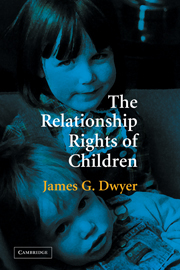Book contents
- Frontmatter
- Contents
- Acknowledgments
- THE RELATIONSHIP RIGHTS OF CHILDREN
- Introduction
- 1 Why Rights for Children?
- 2 The Existing Relationship Rights of Children
- 3 Paradigmatic Relationship Rights
- 4 Why Adults Have the Relationship Rights They Do
- 5 Extending the Theoretical Underpinnings of Relationship Rights to Children
- 6 Rebutting Defenses of the Status Quo
- 7 Implementing Children's Moral Rights in Law
- 8 Applications
- Appendix: The Conceptual Possibility of Children Having Rights
- Notes
- Index
Appendix: The Conceptual Possibility of Children Having Rights
Published online by Cambridge University Press: 23 July 2009
- Frontmatter
- Contents
- Acknowledgments
- THE RELATIONSHIP RIGHTS OF CHILDREN
- Introduction
- 1 Why Rights for Children?
- 2 The Existing Relationship Rights of Children
- 3 Paradigmatic Relationship Rights
- 4 Why Adults Have the Relationship Rights They Do
- 5 Extending the Theoretical Underpinnings of Relationship Rights to Children
- 6 Rebutting Defenses of the Status Quo
- 7 Implementing Children's Moral Rights in Law
- 8 Applications
- Appendix: The Conceptual Possibility of Children Having Rights
- Notes
- Index
Summary
There is a long-standing debate among philosophers about the purpose and conceptual content of rights that has direct implications for the law's treatment of children. It is a somewhat esoteric debate, and one that few people need resolved before they are willing to attribute rights to children, and for that reason I have not addressed it in the main text. But for the sake of any readers for whom the idea of nonautonomous persons having rights seems conceptually confused, I offer here an account and assessment of that debate with a focus on the implications for children, something that the main participants in the debate generally have not done.
The debate has to do with the connection between rights and autonomous choosing. An objection to ascribing rights to children in the contexts addressed in this book would come from those who deny that nonautonomous persons can or should be bearers of rights at all. One might think this debate long rendered moot by actual practice; the law throughout western society has for some time explicitly attributed various sorts of rights to nonautonomous persons, including children, and legal scholars and lawmakers have for some time spoken unhesitatingly about children's rights. Yet some philosophers persist in arguing against this practice, and occasionally some academics and nonacademics who do not regularly focus on the situation of nonautonomous persons assert or take for granted that rights are things only autonomous persons have.
- Type
- Chapter
- Information
- The Relationship Rights of Children , pp. 291 - 308Publisher: Cambridge University PressPrint publication year: 2006

